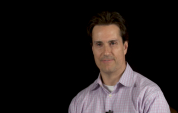5:52 | Thermal imaging had been around for a while and Geoff Farrell was very familiar with it. GPS, however, was new and expensive, and no one was familiar with it. Both were integral to the swift victory in Desert Storm. Before his deployment he declined a dose of an experimental drug that was supposed to protect against chemical weapons and he wonders if that drug contributed to Gulf War Syndrome.
Keywords : Geoff Farrell Iraq Operation Desert Storm thermal imaging Global Positioning System (GPS) LORAN unmanned aerial vehicle (UAV) drone Gulf War Syndrome Saddam Hussein chemical weapons Mission Oriented Protective Posture (MOPP) suit

He considered it the finest education available. Geoff Farrell went to West Point, where he soaked up all the history and knowledge available there. He was assigned to Europe, where he patrolled the German border as Soviet Communism was dying. There was a brief period of jubilation when the wall came down, then they heard about Saddam Hussein.
They had prepared for the wrong war. Geoff Farrell's armored cavalry unit was going to the desert to confront Saddam Hussein, but their vehicles and uniforms were green and all their training was for fighting in European forests. Once they got to the staging area in Saudi Arabia, they adapted well.
Lt. Geoff Farrell was sleeping in the command track when he heard it on the radio. We were at war with Iraq. His armored cavalry unit crossed from Saudi Arabia into Iraq where they were greeted by friendly children in the middle of nowhere.
The rumor was that the Iraqi's Soviet made tanks were superior to ours. Geoff Farrell had this on his mind while rolling across the desert to engage them. Just as they got near, a sandstorm came up. Then the Iraqi artillery began to fall. Then the first Iraqi tank was destroyed, shattering the myth.
After the battle, the men of the 2nd Armored Cavalry did humanitarian work for the Iraqi civilians, then it was time to return to Germany. For Geoff Farrell, a feeling of unreality set in on the flight home. How do you decompress from combat? At least those who fought in this war were not going to experience the humiliation that Vietnam veterans had faced.
For Geoff Farrell, who fought in Desert Storm with the armored cavalry, it was obvious. It was technology and training that ensured victory. We had a lot of it and the Iraqis had very little. Our weapons had a longer range and, when a sandstorm came up in the middle of a battle, we had GPS and thermal imaging.
When the cease fire was declared, American units had not yet reached Baghdad. In his command track, Geoff Farrell had the graphics on his screen to guide him right in, but it was decided we would not go. Looking back to that critical moment, he reflects on the decision.
In his business career, Geoff Farrell applied a lot of things he learned from the military and from his combat experience. Develop and nurture your people and always expect the unexpected.